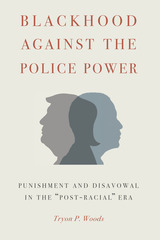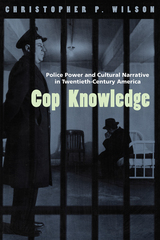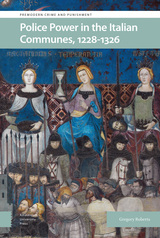3 books about Police Power

Blackhood Against the Police Power
Punishment and Disavowal in the "Post-Racial" Era
Tryon P. Woods
Michigan State University Press, 2019
Both significant and timely, Blackhood Against the Police Power addresses the punishment of “race” and the disavowal of sexual violence central to the contemporary “post-racial” culture of politics. Here the author asserts that the post-racial presents an antiblack animus that should be read as desiring the end of blackness and the black liberation movement’s singular ethical claims. The book redefines policing as a sociohistorical process of implementing antiblackness and, in so doing, redefines racism as an act of sexual violence that produces the punishment of race. It smartly critiques the way leading antiracist discourse is frequently complicit with antiblackness and recalls the original 1960s conception of black studies as a corrective to the deficiencies in today’s critical discourse on race and sex. The book explores these lines of inquiry to pinpoint how the history of racial slavery wraps itself in a new discourse of disavowal. In this way, Blackhood Against the Police Power responds to a range of texts, policies, practices, and representations complicit with the police power—from the Fourth Amendment and the movements to curtail stop-and-frisk policing and mass incarceration to popular culture treatments of blackness to the leading academic discourses on race and sex politics.
[more]

Cop Knowledge
Police Power and Cultural Narrative in Twentieth-Century America
Christopher P. Wilson
University of Chicago Press, 2000
Whether they appear in mystery novels or headline news stories, on prime-time TV or the silver screen, few figures have maintained such an extraordinary hold on the American cultural imagination as modern police officers. Why are we so fascinated with the police and their power? What relation do these pervasive media representations bear to the actual history of modern policing?
Christopher P. Wilson explores these questions by examining narratives of police power in crime news, popular fiction, and film, showing how they both reflect and influence the real strategies of law enforcement on the beat, in the squad room, and in urban politics. He takes us from Theodore Roosevelt's year of reform with the 1890s NYPD to the rise of "community policing," from the classic "police procedural" film The Naked City to the bestselling novels of LAPD veteran Joseph Wambaugh. Wilson concludes by demonstrating the ways in which popular storytelling about police power has been intimately tied to the course of modern liberalism, and to the rising tide of neoconservatism today.
"A thorough, brilliant blend that crosses disciplines."—Choice
"[S]ophisticated, highly theoretical and ambitious. . . . Connects the history of policing to cultural representations of crime, criminals and cops."—Times Literary Supplement
"[A] deeply satisfying approach to the crime narrative. . . . [Wilson] focuses, ultimately, on the role of police power in cultural storytelling."—American Quarterly
Christopher P. Wilson explores these questions by examining narratives of police power in crime news, popular fiction, and film, showing how they both reflect and influence the real strategies of law enforcement on the beat, in the squad room, and in urban politics. He takes us from Theodore Roosevelt's year of reform with the 1890s NYPD to the rise of "community policing," from the classic "police procedural" film The Naked City to the bestselling novels of LAPD veteran Joseph Wambaugh. Wilson concludes by demonstrating the ways in which popular storytelling about police power has been intimately tied to the course of modern liberalism, and to the rising tide of neoconservatism today.
"A thorough, brilliant blend that crosses disciplines."—Choice
"[S]ophisticated, highly theoretical and ambitious. . . . Connects the history of policing to cultural representations of crime, criminals and cops."—Times Literary Supplement
"[A] deeply satisfying approach to the crime narrative. . . . [Wilson] focuses, ultimately, on the role of police power in cultural storytelling."—American Quarterly
[more]

Police Power in the Italian Communes, 1228-1326
Gregory Roberts
Amsterdam University Press, 2019
Medieval states are widely assumed to have lacked police forces. Yet in the Italian city-republics, soldiers patrolled the streets daily in search of lawbreakers. Police Power in the Italian Communes, 1228-1326 is the first book to examine the emergence of urban policing in medieval Italy and its impact on city life.Focusing on Bologna in the thirteenth and early fourteenth centuries, Gregory Roberts shows how police forces gave teeth to the communes' many statutes through a range of patrol activities. Whether seeking outlaws in the countryside or nighttime serenaders in the streets, urban police forces pursued lawbreakers energetically and effectively. They charged hundreds of individuals each year with arms-bearing, gambling, and curfew violations, convicting many of them in the process. Roberts draws on a trove of unpublished evidence from judicial archives, rich with witness testimony, to paint a vivid picture of policing in daily life and the capacity of urban governments to coerce.Breaking new ground in the study of violence, justice, and state formation in the Middle Ages, Police Power in the Italian Communes sheds fresh light on the question of how ostensibly modern institutions emerge from premodern social orders.
[more]
READERS
Browse our collection.
PUBLISHERS
See BiblioVault's publisher services.
STUDENT SERVICES
Files for college accessibility offices.
UChicago Accessibility Resources
home | accessibility | search | about | contact us
BiblioVault ® 2001 - 2024
The University of Chicago Press









